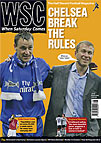 The murder of Davor Suker’s business partner last month has thrown the spotlight on a web of intensive wheeler-dealing within the game, as Jules Brandon explains
The murder of Davor Suker’s business partner last month has thrown the spotlight on a web of intensive wheeler-dealing within the game, as Jules Brandon explains
Davor Suker, once of Real Madrid, Arsenal and West Ham, has made front page news in his native Croatia recently but not for footballing reasons. In the early morning of June 11, Suker’s business partner, Dino Pokrovac, 43, who represented more than a dozen Croatian players, was shot several times at the entrance to his apartment in the affluent Zagreb suburb of Sigecica. Evidence at the scene suggested that the murder had been meticulously planned and the general belief is that it must have been football-related. A wallet that Pokrovac always carried with him, said to contain the names and addresses of his many debtors, was stolen. According to police reports, the debtors owed the deceased various amounts up to several hundred thousand euros. Suker, who flew in from London to be questioned for three hours the day after the murder, is among 20 people to have been interviewed so far.
Dino Pokrovac had moved to Sigecica when he was ten. Earning a reputation as a tough guy, he became the chief bouncer at Saloon, the city’s biggest disco at the time. While working there he met several footballers with the local club, Dinamo, including the current Croatian national team coach, Zlatko Kranjcar, and Portsmouth’s Velimir Zajec. Though not given to violent outbursts, Pokrovac soon gained a reputation for being involved in dubious business ventures. His first financial windfall came from a well organised network of black-market trade operations, and the resale of cars stolen in western Europe, then registered with false documents. Later he started to increase his income by issuing high-interest loans. His speciality was gamblers willing to mortgage and sell anything to get out of debt. Pokrovac always refused to admit that he was involved in money lending. However, it was known that a small café and car wash he owned were fronts for his other businesses.
A keen player of indoor football as well as a regular spectator at Croatian league games, Pokrovac socialised with many players and coaches. In time, he started lending money to some of them. One of his biggest clients was the new coach of Dinamo, Josip Kuze, who even mortgaged his house to get out of debt. Kranjcar was another to have borrowed cash, which later led to him offering Pokrovac the exclusive rights to represent his son, Niko. The latter, a striker, is regarded as one of Croatia’s best young talents, and was once linked with Arsenal; he has recently moved from Dinamo to Pokrovac’s favourite club, current champions Hajduk Split. Pokrovac had poured significant funds into Hajduk and was the main driving force behind the appointment of their coach, former national team manager Miroslav Blazevic, three months ago.
One of the people Pokrovac had played football with in Sigecica in the 1980s was clothing salesman Zdravko Mamic, who eventually became a wealthy entrepreneur and board member at Dinamo Zagreb. In 1999, Pokrovac and Suker formed an agency and began managing players, which meant having to do business with club officials such as Mamic. Four years later, Mamic told police that he had received several anonymous death threats. He claimed to have no idea who was behind them, but it is widely believed that they were prompted by the transfer, in the summer of 2003, of international striker Ivica Olic (scorer of Croatia’s winning goal against Italy in the 2002 World Cup) from Dinamo to CSKA Moscow. Several people had a share in Olic including Pokrovac and a group of his friends. About €250,000 went missing during the deal, for which Olic’s manager, Dragan Maric, blamed Mamic. The latter was said to have feared Pokrovac though the two never clashed publicly.
Niko Kranjcar’s transfer to Hajduk has been a big success and he is expected to sign for a foreign club next summer (he has already turned down an offer from CSKA). Pokrovac and Suker also hit the jackpot by selling national team defender Mate Neretljak to a Korean team while the other players they represent are mostly doing well. Had he stayed alive, Pokrovac was set to establish himself as Croatia’s leading football agent. Davor Suker has been advised by his solicitor not to comment on the case but indications are that he is now also afraid for his life.
From WSC 222 August 2005. What was happening this month